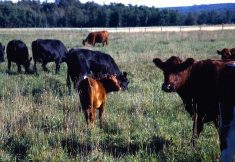The Canadian Cattlemen’s Association (CCA) focus on trade and market access priorities continued to bear fruit in 2018 and set the stage for a sustainable future for Canadian beef production. The events of 2018 created unprecedented opportunity for producers as we head into the new year. The Comprehensive and Progressive Agreement for Trans-Pacific Partnership (CPTPP) came into effect on December 30, 2018, and Canada signed the Canada, United States and Mexico Agreement (CUSMA) on November 30. Once ratified, the CUSMA will update, modernize and replace the North American Free Trade Agreement (NAFTA). Originally agreed to September 30, the timing of the “NAFTA 2” trade pact was meaningful for cattle producers as they entered the fall run. The CUSMA preserves and will secure the duty-free access upon which the Canadian beef cattle sector has been built over the past 25 years, certainty that helped cattle buyers feel confident about the long-term stability of the market.
Read Also

The Canadian Cattle Association’s international advocacy efforts
Global ag policies affect Canadian food policy, so the Canadian Cattle Association participates in international and domestic forums
Underpinning this optimism, November’s 2018 Fall Economic Statement announced a new $1.1 billion Export Diversification Strategy to maximize opportunities for exporters in new markets, and a commitment of $25 million over the next five years to enhancing federal capacity to address non-tariff and other trade barriers specific to agri-food. This is excellent news as such barriers often prevent exporters from taking advantage of new export opportunities. These export-related provisions dovetail nicely with the intended outcomes of the National Beef Strategy, namely, to position the Canadian beef industry for greater profitability, growth and continued production of a high-quality beef product of choice in the world.
An updated National Strategy covering the period 2020-2024 will be released in 2019. As chair of the Beef Advisors, which provides oversight to the strategy, I’m confident both the progress captured in the recent status update and direction of the strategy will provide producers with reason for ongoing optimism in the industry.
The beef industry is in a perpetual state of forward motion and the CCA is working hard to ensure sustainably raised Canadian beef is top of mind in key areas. The CCA was in Poland for the 24th Conference of the Parties to the United Nations Framework Convention on Climate Change (COP24). Our industry continually strives to be a global leader in sustainable beef production and a partner in dually achieving Canada’s economic and environmental targets. Attending, observing and sharing the Canadian perspective on sustainable agriculture for the future at COP24 is a big piece of that.
CCA returned to Japan in early December to promote Canadian beef. We know importers want a consistent supply of Canadian beef and expect that under the CPTPP, Canadian beef exports to Japan could double in 2019, up from the $160 million of beef exported to Japan in 2017 under the old tariffs.
In Japan, on December 30, 2018, the tariff of 38.5 per cent dropped to 27.5 per cent on Canadian fresh beef and to 26.9 per cent on frozen beef. On April 1, 2019, Canada will enjoy a second tariff cut in Japan on both fresh and frozen product, with more cuts to come. With CPTPP, Canadian beef will also be exempt from the Japanese safeguard tariff of 50 per cent on beef.
CCA and Canadian Pork Council (CPC) undertook a mission to Germany, Poland and Spain in November, as part of an ongoing series of missions to EU countries to continue to build co-operation and collaboration for commercially viable two-way trade of meat products between Canada and the EU as envisaged by the Canada-European Union Comprehensive Economic and Trade Agreement (CETA).
As an example of this budding reciprocal two-way trade relationship under CETA, in 2018, from January to September, 241 tonnes of veal from the EU were imported into Canada, with the majority coming from the Netherlands, along with 2,255 tonnes of beef valued at $13.2 million. Exports of Canadian beef alone to the EU for the same period reached 520 tonnes valued at $8.2 million, representing a 45 per cent increase in volume and a 45 per cent increase in value compared to a year earlier.
Interest in Canadian beef in EU countries continues to grow and is an opportunity for Canadian producers to produce more EU beef. In December, international trade officials with the Canadian Embassy in The Hague, helped organize a local Alberta beef event in the Netherlands. The distributor De Zeeuw’s (Rotterdam) had decided to promote Alberta beef just a month earlier after getting good responses from their clients. The invite list included local restaurants and hotels from The Hague and Rotterdam area. Shipments from Canada have tripled in volume, the distributor reported, and efforts are underway to continue to grow interest. Currently, the distributor orders just two pallets per week from the importer.
We continue to watch CUSMA with interest. The CUSMA will come into force the first day of the third month of all countries completing their respective ratification process. Mid-March has been the popular estimate of the earliest that the U.S. Congress could approve the agreement. In early December, President Trump triggered the six-month notice for the U.S. to withdraw from the old NAFTA as a means to gain leverage over Congress to move diligently in approving the new agreement. The CCA will be keeping a close eye on how both the congressional approval and the withdrawal timelines converge and provide predictable continuity.
Until next time.
















